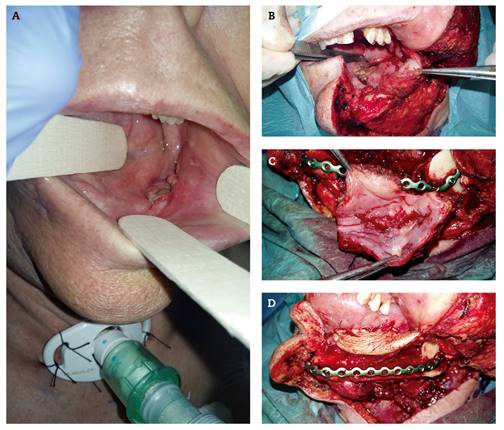My SciELO
Services on Demand
Journal
Article
Indicators
-
 Cited by SciELO
Cited by SciELO -
 Access statistics
Access statistics
Related links
-
 Cited by Google
Cited by Google -
 Similars in
SciELO
Similars in
SciELO -
 Similars in Google
Similars in Google
Share
Revista Española de Cirugía Oral y Maxilofacial
On-line version ISSN 2173-9161Print version ISSN 1130-0558
Rev Esp Cirug Oral y Maxilofac vol.43 n.2 Madrid Apr./Jun. 2021 Epub Sep 13, 2021
https://dx.doi.org/10.20986/recom.2021.1300/2021
EDITORIAL
Cancer does not understand about coronavirus
1Director de RECOM. Facultativo Especialista de Área. Hospital Universitario de Badajoz. Badajoz, España
2Práctica Privada, Hospital Quirónsalud Clideba. Badajoz, España
Despite the current situation of the COVID-19 pandemic for which, against all odds (still in July 2021) a short-term end is not in sight, the healthcare pressure exerted by tumor pathology continues to take up time and material and humans resources from our National Health System (NHS). Indeed, after several months of systematic reduction in the number of surgical interventions that has been registered in the successive waves of the pandemic, in order to focus limited resources in the fight against SARS-CoV-19, the head and neck cancer patient has required surgical treatment by the Maxillofacial Surgeon with the same incidence as in the pre-pandemic times and, in many cases (unfortunately and due to the delay in diagnosis derived from confinement and saturation of Primary Care Centers), it has experienced an evolution to late phases or advanced stages of the disease, which has required more aggressive oncological resections, with more complex reconstructions and a logical worsening of its prognosis in the short and medium term.
In this issue of Revista Española de Cirugía Oral y Maxilofacacial we have wanted to highlight the importance of patients with tumor pathology in the head and neck area and the oral cavity, in a monographic series of clinical cases of patients with tumor pathology, mostly malignant and, in some cases, benign but with aggressive behavior to a greater or lesser degree, which illustrates the diversity of their presentation, beyond the absolute majority diagnosis in terms of frequency and healthcare implications of the oral squamous cell carcinoma (Figure 1 and Figure 2). All the cases presented constitute rarities due to their infrequent appearance or insufficient knowledge at the level of their diagnostic-therapeutic management and definitively provide new casuistry to the overall literature, which will be decisive in the generation of consolidated knowledge over time and compiled series of cases through systematic reviews. Disseminated Kaposi's sarcoma with onset in the maxillary gingiva, mandibular metastasis of lung adenocarcinoma, sacral metastasis of low-grade acinar cells of the parotid gland, and cuniculatum carcinoma of the buccal mucosa are some of the rare cases that the reader will have will have the opportunity to approach by reading the current number.

Figure 1 A. Squamous cell carcinoma of the mandibule. B. Upper cheek flap approach. C. Resection of the tumoral piece involving gingiva and left hemimandible. D. Reconstruction with a vascularized fibular free flap.

Figure 2 A. Squamous cell carcinoma of the tongue. B. Hemiglosectomy and reconstruction with a radial forearm free flap.
The role of the Maxillofacial Surgeon continues to be central in the treatment of head and neck and oral cavity cancer, since surgical resection constitutes the fundamental pillar and the primary therapeutic option in a vast majority of cases. Of course, it should be complemented with the administration of post-operative radiotherapy in cases where there are indications for it, usually derived from tumor-dependent factors and, in cases of advanced disease, with the administration of post-operative chemo-radiotherapy (CRT). Clinicians and managers of the NHS should be concerned that the incidence of cancer in advanced stages may increase in the current health crisis, and that surgery as a primary option and, therefore, curative, gives way to a greater number of patients treated with purely palliative options, in which surgery is not feasible due to tumor unresectability or severe imbalance of benefits and risks or the appearance of unacceptable sequelae.
In this sense, it is essential to carry out cross-sectional studies in the current pandemic situation, which evaluate the prevalence of patients with advanced oncological disease and the increase in disease-dependent mortality in our and other specialties, since it seems logical to infer that both factors can have increased significantly in the current pandemic crisis. Health authorities must make an effort to try to "plug this possible waterway on the waterline" of the healthcare system, since, knowing that resources are always limited, it is no less true that cancer patients also deserve our NHS, all the effort and resources so that they receive the best possible assistance, in times of diagnosis and treatment, at least in a way similar to that received in the pre-pandemic stage.
Let's not let the "informative news", sometimes suffocating, silence a reality that has not ceased to be present during the last year and a half...
... Cancer does not understand about coronavirus.











 text in
text in 


